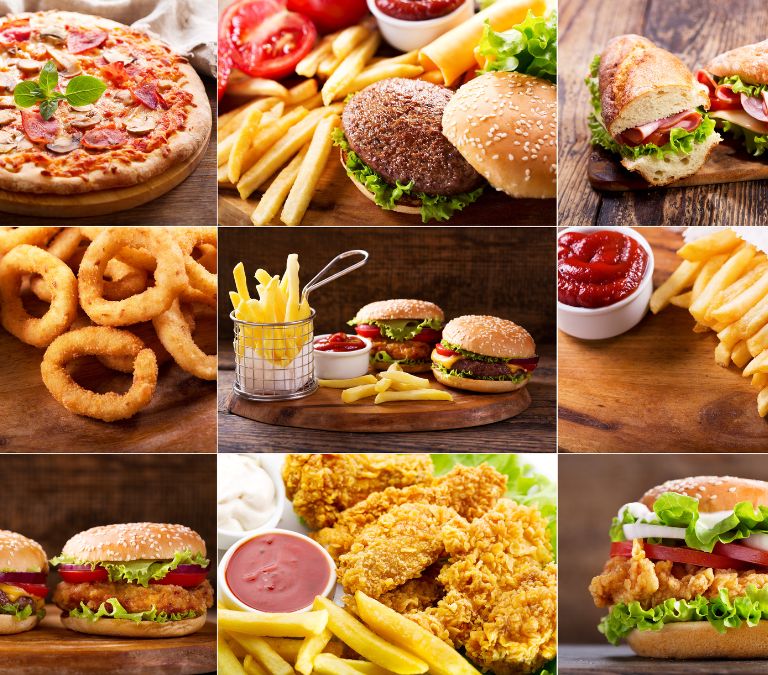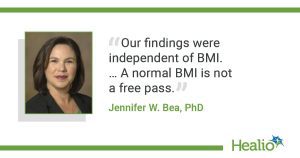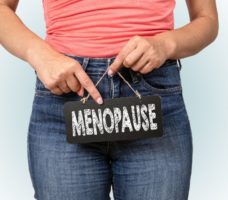Are you a woman who is gradually approaching menopause? Or perhaps it could be that you are also in menopause. Unfortunately, many women often consider menopause the stage of womanhood where all the negative changes. Hot flashes, irritability, weight gain, and mood swings—put together, make menopause a dreaded phase of every woman’s life.
With this primer, you must keep informed on what can help you get through this transition more easily, primarily by following a menopausal diet and making certain lifestyle changes. Menopause is a natural transition that occurs in every woman.
It is a process linked with many unfavorable symptoms and even exposes you to certain health risks. For example, eating certain foods during menopause only worsens your menopausal symptoms. Although menopause is a natural body process every woman goes through, your diet can significantly change how well your body manages this natural transition.
Foods You Should Not Eat during Menopause

Fatty Foods
During menopause, some women tend to gain fat while also losing muscle mass. According to Halle Saperstein, a clinical dietitian at Henry Ford Health, increased visceral fat makes you more susceptible to heart diseases, hypertension, and increased insulin resistance, leading to diabetes.
The American Hearts Association also says that women have an increased chance of having heart disease because of menopause; eating fatty foods increases this risk. So as much as possible, try to cut your intake of fatty foods to the barest minimum.
Foods like bacon and brisket are high in saturated fats and can also cause a drop in your serotonin levels. When this happens, you begin to feel irritable and angry. So when shopping for meats, it is advisable to skip the greasy types and stick to chicken, turkey, ground beef, or fish.
Opt for healthier fat sources in your diet, such as omega-3 fatty acids and nutty fats. Omega 3 helps reduce the severity of symptoms like hot flashes and night sweats. Foods rich in omega-3 fatty acids include fatty fish such as mackerel, anchovies, and salmon; and seeds chia, hemp, and flax.
Fast Food
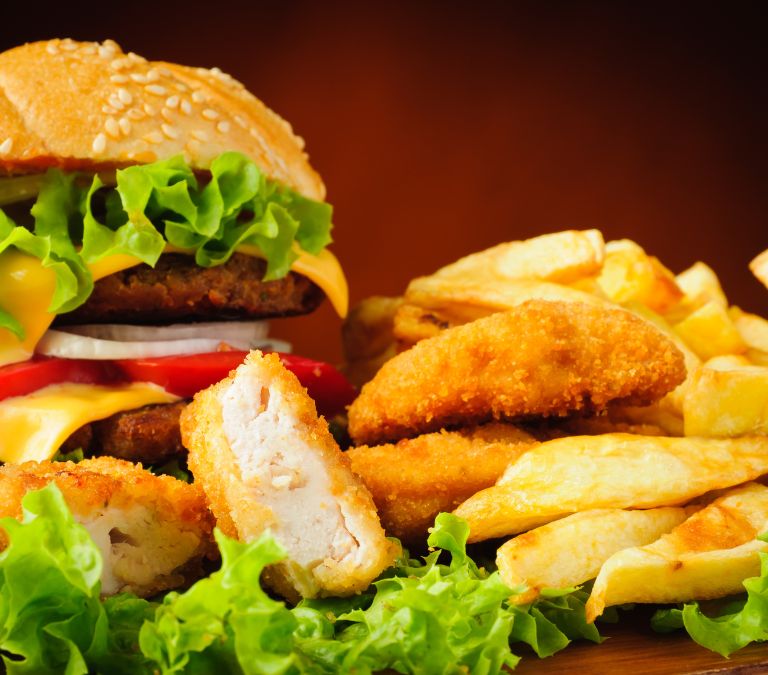
While having fast food may be a convenient and quick fix, it harms your body more than the temporary satisfaction you get. Fast food usually promotes weight gain and increases your risk of heart disease. It is also important to avoid fast foods because they cause weight gain and aggravate menopausal symptoms like every other fatty food. If you must snack or get quick food, choose healthier menu options, skip that cheeseburger, and have a chicken sandwich instead. It is best to cook your meals and have healthy food on hand by freezing your leftovers and packing your meals.
Foods with Added Sugars and Processed Carbs
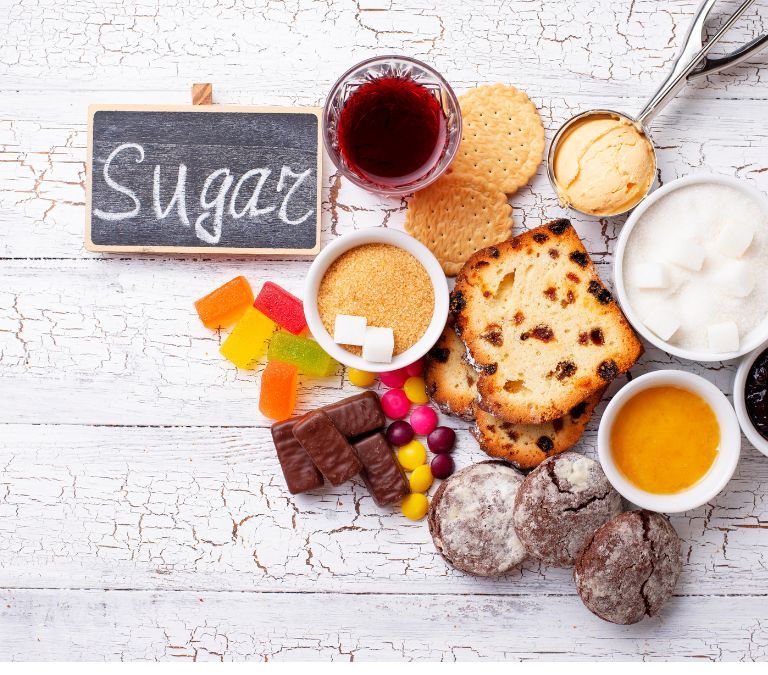
Processed foods and added sugars tend to cause a rapid increase in blood sugar levels. Women who have a high intake of processed foods have insulin resistance linked to hot flashes. The more processed the food is, the more severe its effect on your blood sugar is.
You must limit your intake of processed foods and sugars such as white bread, crackers, white rice, pasta, pizza, cookies, cakes, and other baked goods. Instead, snack on fruits, and It is recommended that you keep your sugar intake to less than 10% of your daily calorie intake.
Snack on food containing natural sugars such as fruits and nuts in between meals instead since it helps control how much sugar you digest. Many of these processed goods are high in sugar and have a high sodium quantity. Your body ideally needs only a small amount of sodium, but diets high in sodium increase the risk of high blood pressure, stroke, and other heart diseases. Unhealthy sugar levels in the body may also cause bloating, fatigue, and weight gain.
Spicy Foods

Foods that have a high spicy content should be avoided for menopausal women. Spicy foods trigger a lot of sweating, flushes, and hot flashes. Suppose you notice that you tend to feel hot more frequently or experience night sweats. Then, it is better to cut back on or completely cut out spicy foods such as cayenne, jalapeño, and other hot peppers. Instead, it is best to use spices that add flavor and not heat to your food, such as curry, basil, turmeric, and cumin.
Studies have gone further to confirm that spicy foods cause increased hot flashes. Still, they also cause an increase in anxiety levels in menopausal women. For example, one study involving 896 menopausal women in Spain and South America examined and confirmed the association between hot flashes and spicy food intake.
Alcohol
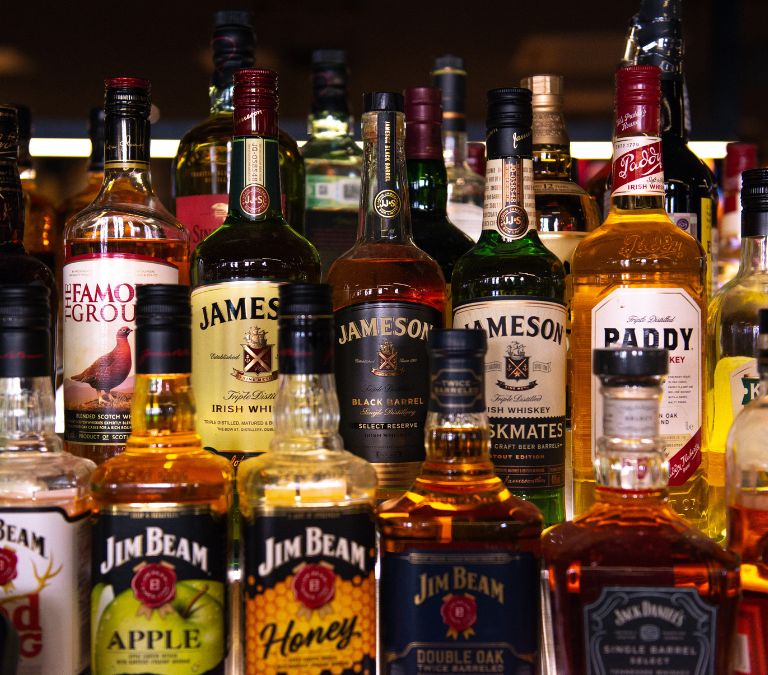
The 2015–2020 U.S. Dietary Guidelines for Americans suggest that moderate drinking is defined as having one drink per day or less for women. Women who have more than this recommendation daily are 1.5 times more at risk of breast cancer than those who don’t drink.
According to the North American Menopause Society, excessive drinking can increase your risk of having cardiovascular disease. In addition, some women find that alcohol makes them experience hot flashes. If you discover that alcohol aggravates your menopausal symptoms, it is best to try avoiding it.
If you have any alcohol intake, let it be a white wine spritzer rich in fruit. It is lower in alcohol than other drinks. Alcohol increases symptoms such as hot flashes, night sweats, headaches, mood swings, and even depression. Alcohol also heavily impacts the already fluctuating hormones and dilation of women’s blood vessels in menopause.
Caffeine

Caffeine is a natural stimulant in tea, coffee, cocoa plants, and energy drinks. It stimulates the brain and nervous system and helps you stay awake and alert. Once consumed, caffeine is easily absorbed into the bloodstream and the liver, broken down into compounds that may affect how your organs work. While caffeine may boost metabolism, taking it in large quantities has long-standing effects. It has negative effects such as anxiety, restlessness, and sleeplessness.
For women in menopause, taking caffeine only increases your already high chances of sleep disruption. Like alcohol, consuming caffeine exacerbates night sweats and hot flashes caused by the constriction of your blood vessels. Therefore, avoiding coffee, ice cream, soft drinks, energy drinks, chocolate, and tea (black or green) is best. If you must have tea, it is best to stick with herbal teas. If you need some extra energy boost, try taking a quick walk or doing some exercise.
Salty Foods
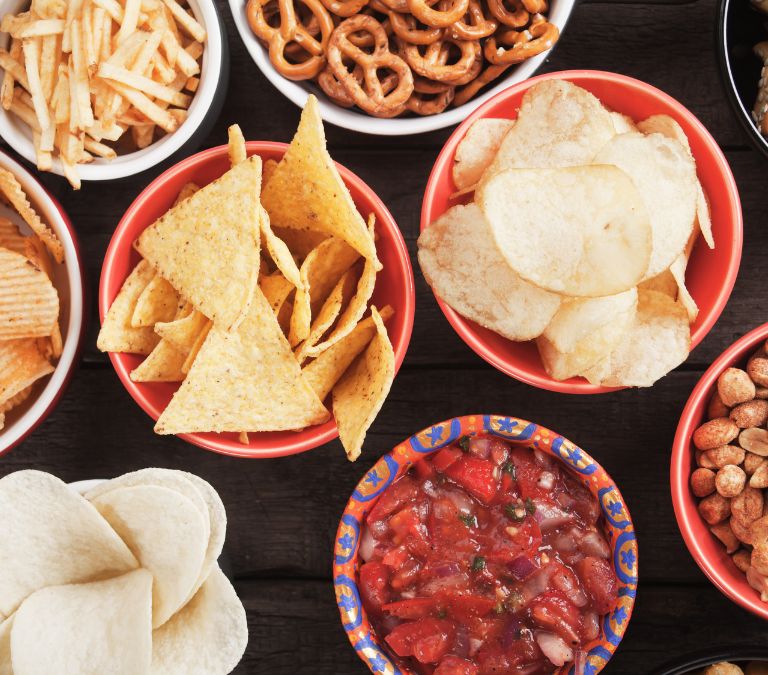
Salt is high in sodium. A study conducted on over 9,500 women in the post-menopause phase observed that taking in sodium of more than 2 grams per day has a 28% higher risk of low bone mineral density. In addition, studies show that high salt intake has been associated with lower bone density in postmenopausal women.
In addition, after menopause, there is a decline in your estrogen hormone, which increases your risk of developing high blood pressure. Reducing your sodium intake may help lower this risk of high blood pressure. Women who stay on a moderate sodium diet experience an overall better mood than women with no salt restrictions.
Furthermore, in a randomized study of 95 postmenopausal women, those who followed a moderate-sodium diet experienced better overall mood than women who followed a generally healthy diet with no salt restriction. However, too much salt can also lead to dehydration, anxiety, palpitations, joint pains, and dry skin. The healthy limit of salt per day is 6 grams, about 1 tablespoon.
Smoking
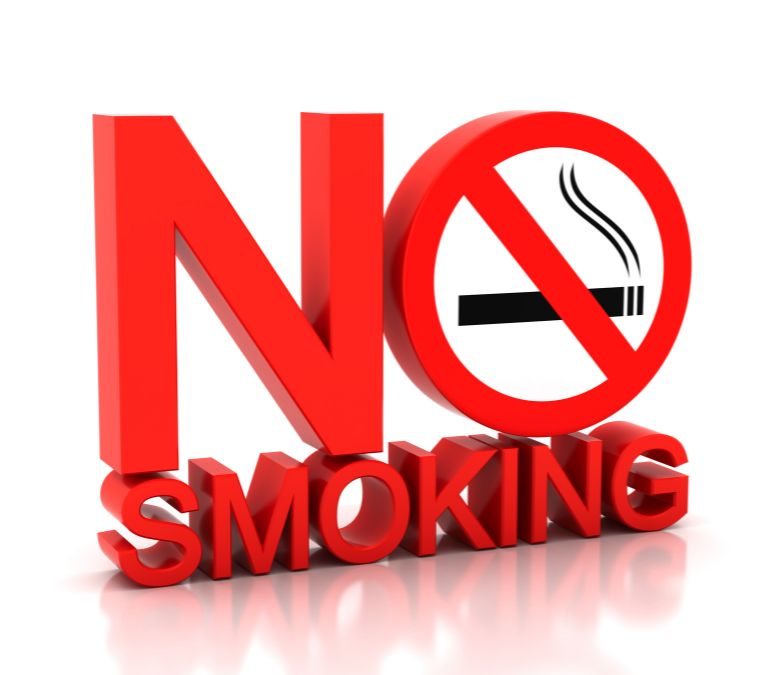
Smoking lowers a woman’s estrogen level and causes hair thinning, dry skin, and memory problems. It is important to stop smoking because, after menopause, women are already at a high risk of osteoporosis and heart diseases. Smoking only aggravates these problems at a higher rate in women who smoke. Women who smoke are also more likely to experience mood swings, vaginal dryness, and fatigue.
In addition, because menopausal women are already at risk of having high blood pressure, they should avoid smoking. Research also shows that smoking causes early menopause and irregular, painful periods in younger women. It is also likely to cause more hot flashes than women who don’t smoke.
Low-Calorie Intake
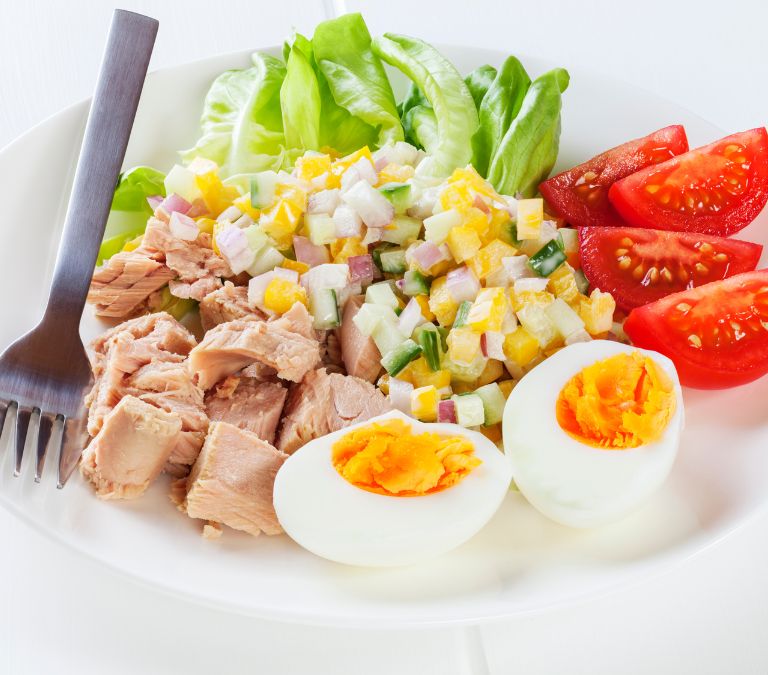
While this may not necessarily be a type of food, it is something to avoid during menopause. During menopause, the number of calories you burn while at rest decreases. It means that weight gain is common for women in menopause. Because of this inevitable weight gain, many women panic and turn to a low-calorie diet.
While turning to a low-calorie diet might help you lose weight in a short time, it is not a sustainable dietary lifestyle. The truth is that low-calorie diets can tamper with your muscle mass and metabolism so much that keeping off the excess weight becomes harder than before you started your low-calorie diet.
It is simply an unhealthy choice that needs to be avoided. Your body needs a certain amount of calories daily, and you must provide it with this requirement. Your body requires calories to aid digestion, help your organs function, and fuel your body for physical activity. Reducing calorie intake also affects your body’s nutrients, such as protein and calcium. For a woman going through menopause, all of these nutrients are essential to her body.
So instead of cutting out calories from your diet, you should practice a little restraint when eating by watching your portion sizes. This gentle process is more effective and healthier than slashing the number of calories you take in daily. If you also follow this process, you’ll be able to keep up with it for a long time.
Foods You Can Eat during Menopause
Dairy Products
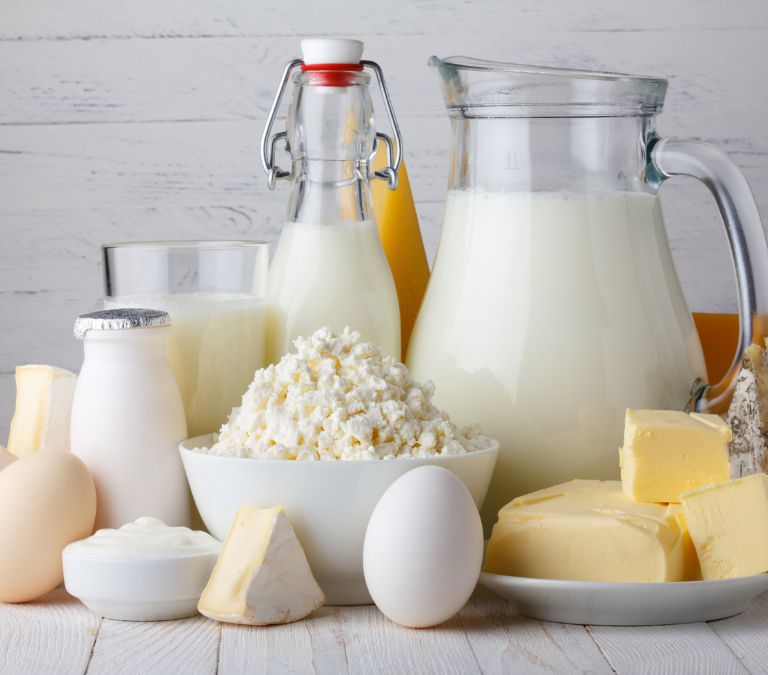
The decline in estrogen levels during menopause increases the chances of menopausal women having fractures. In addition, dairy products such as yogurt, milk, and cheese contain nutrients such as calcium, phosphorus, magnesium, potassium, and vitamins D and K.
These are all essential to maintaining proper health for your bones. In a study on 750 menopausal women, those who consumed more dairy and animal protein had a higher bone density. They did not lose as much muscle mass.
Dairy also helps to improve sleep. Foods rich in amino acid glycine, which is found majorly in milk and cheese, were found to promote better sleep in women going through menopause. High vitamin D and calcium – also found in milk and cheese -are also proven to decrease the risk of premature menopause in younger women by about 17%. It is recommended to have at least 3 servings of dairy per day.
Fruits and Vegetables
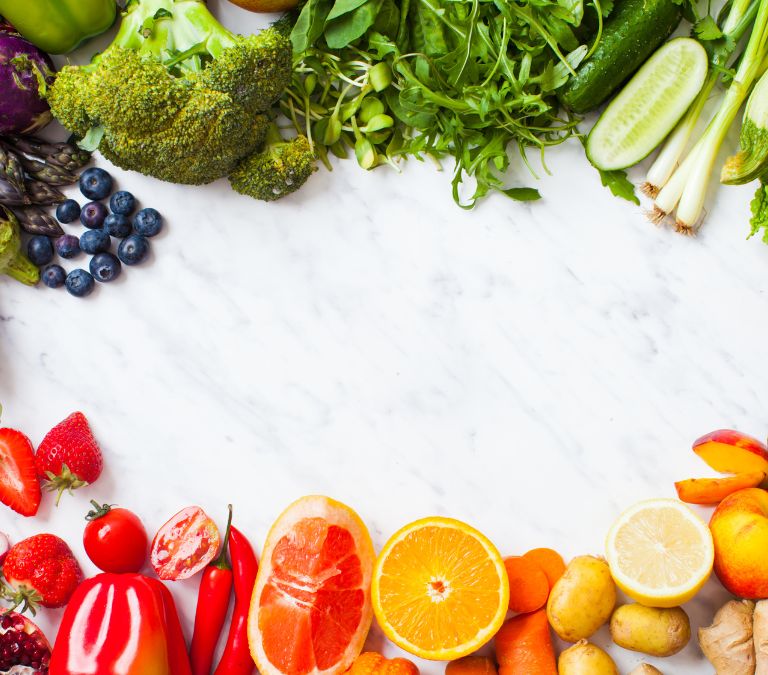
Menopause causes changes in metabolism, reduced bone density, and an increased risk of heart diseases. Fruits and vegetables contain fiber, vitamins, minerals, and antioxidants. The American dietary guidelines recommend filling at least half of your daily plate with fruit and vegetables. Research has shown that menopausal women who eat a healthier diet of fruits, vegetables, and fiber, experience a reduction in their hot flashes by about 19%. Cruciferous vegetables may be beneficial for postmenopausal women.
Eating vegetables like broccoli, Brussel sprouts, cauliflower, collard greens, and cabbage has helped decrease the production in levels of a type of estrogen.
Fruits such as dark berries also benefit women going through menopause. A study on 60 menopausal women showed that eating about 25 grams of freeze-dried strawberry powder helped lower blood pressure. So have at least 2 cups of vegetables. In addition, women who take grape extract supplements experience lesser hot flashes, better sleep, and a lower tendency to depression.
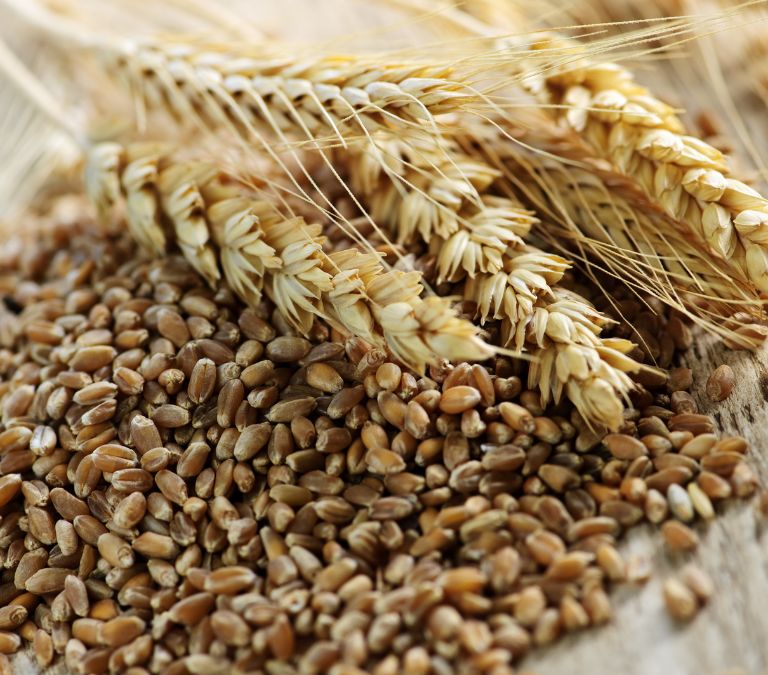
Whole grain is a cereal grain that retains the cereal’s endosperm, germ, and bran instead of refined grains, which maintain only the endosperm.
Whole grains are high in nutrients such as fiber and all the B vitamins, including riboflavin, thiamine, niacin, and pantothenic acid. Examples of whole grains include barley, brown rice, millet, oatmeal, buckwheat, quinoa, whole wheat bread, pasta, or crackers.
A diet high in whole grains has been shown to reduce the risk of heart disease, cancer, and premature death in menopausal women. People who eat the recommended 3 or more servings of whole grains per day are 20-30% less at risk of developing heart diseases and diabetes.
Foods Containing Phytoestrogen Foods

Phytoestrogen – estrogen found in plants – is a substance that occurs naturally in plants. Phytoestrogen is similar in its chemical structure to the estrogen hormone found in women. They are compounds in plant-based foods that act as weak estrogens in your system. Most recent research suggests that phytoestrogen is of great health benefits for women going through menopause.
Foods naturally rich in phytoestrogen include soybeans, chickpeas, peanuts, flax seeds, barley, grapes, berries, plums, and green and black tea. Apart from their oestrogenic benefits, phytoestrogen provides the body with nutritional content such as protein, fiber, vitamins, and minerals. Soy protein and isoflavone supplements also help lower the amount of LDL cholesterol in the body and hot flashes.
Studies have also shown a link between phytoestrogen consumption and a reduction in cardiovascular risks, bone density, and menopausal symptoms. About a third of women who have a diet containing high amounts of phytoestrogen, particularly soy foods, have their menopausal symptoms improved. However, only about one-third of people have the specific bacteria that convert soy isoflavone daidzein to equol’s more effective form.
Postmenopausal women who take soy isoflavone supplements regularly for about 4 weeks have their estrogen level increased by 14%.
Lean Protein
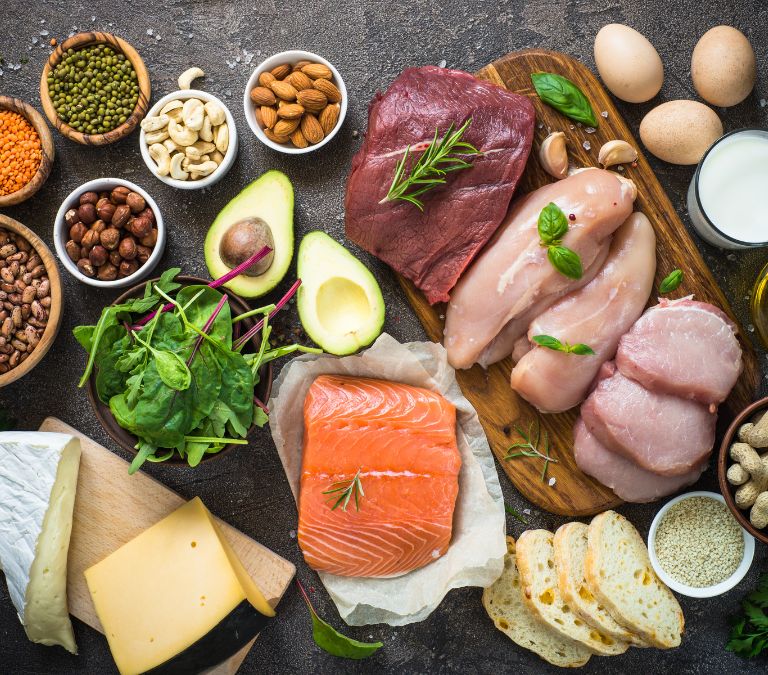
The decline in estrogen levels during menopause causes decreased muscle mass and bone strength. It is better to eat plenty of lean protein to put this in control. The American dietary guidelines recommend that women in menopause eat about 0.45-0.55 grams of protein per pound of body weight daily or 1-1.2 grams per kg.
It is about 20-25 grams of protein per meal. The recommended macronutrient range for protein is at least 10-35% of your daily caloric intake. Eating dairy protein also lowers your risk of a broken hip by 8%, while there is a 12% reduction with plant protein.
Foods such as fish, legumes, and nuts. Also, try eggs, lean meat, fish, legumes, dairy products, and tofu containing high protein. You could also add protein powders to your smoothies. Women who also take about 5 grams of collagen peptides have significantly better bone mineral density. Collagen is the name of the most abundant protein in your body.
Fiber
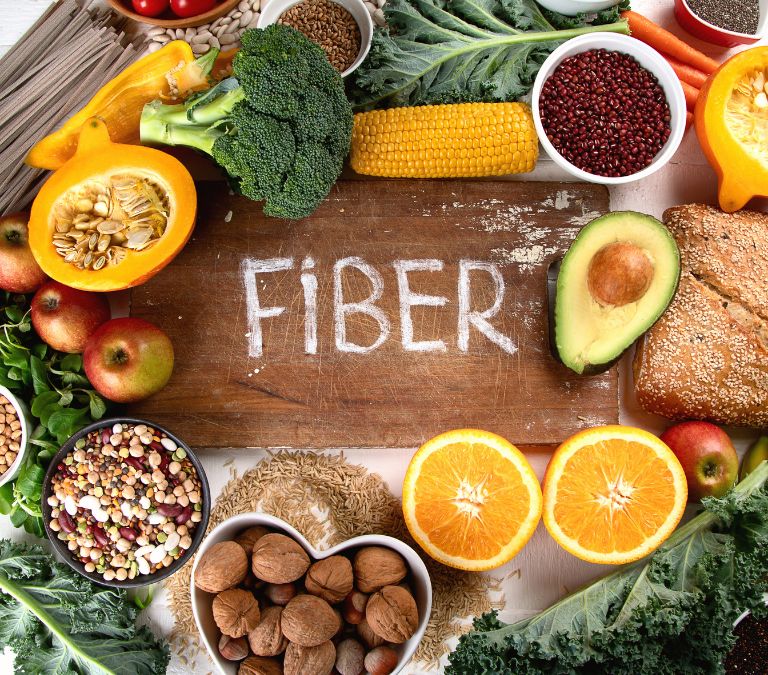
Fiber-rich diets are good for everyone but are especially beneficial for women in menopause. The human stomach cannot digest it, but it feeds the microbes found in your gut. Fiber helps keep your digestive system healthy and flushes out excess cholesterol and harmful carcinogens from the body.
Certain dietary fibers also help your digestive system absorb necessary nutrients from food better. Soluble fibers are the types of fibers that dissolve in the stomach and convert into a gelatinous substance. Once these fibers have become gelatinous, they slow down digestion, allowing the bacteria in your digestive tract to properly extract nutrients passed through the intestinal lining and straight into the bloodstream.
Menopausal women need more necessary nutrients to help maintain the overall health of their bodies. Nutrients like Vitamin D, zinc, Vitamin C, magnesium, and many more need to be properly extracted from your food to help your body create new cells to maintain your muscle mass and bone density, which can be primarily affected during menopause.
In addition to aiding digestion, fiber also helps with weight management. For example, a woman in her menopausal transition is likely to gain about 3% of her body weight yearly because menopause changes sex hormones which, in turn, changes metabolism rate, blood sugar levels, and fat distribution in the body.
Fiber helps to check weight gain by suppressing your appetite and preventing you from overeating. By slowing down the digestion process, your digestive system signals to your brain that it is full and cannot take any more food. Your brain will then suppress your appetite to prevent you from eating. It helps you maintain a steady, healthy, moderate diet and lower unnecessary food cravings.
Fiber is also particularly good for menopausal women in dealing with depression. Foods such as beans, oatmeal, legumes, nuts, berries, broccoli, avocados, vegetables, and apples are rich in fiber. They have been proven to reduce the risk of depression in women going through menopause.
Water

Drinking enough water can help your body with menopausal symptoms such as reducing vaginal dryness, improving the skin’s appearance, and decreasing bloat by moving fibrous foods along in the digestive system, all of which are caused by low estrogen levels. While there is no prescribed amount of water to drink daily, you should drink at least 8-10 glasses of water every day.
It is also important to pay attention to your urine. If you’re properly hydrated, your urine should be a pale yellow. Any other color might mean that you are dehydrated. Other signs of dehydration include muscle cramps, dry skin, fatigue, thirst, and confusion. Water also helps to improve digestion and reduce bloating caused by hormonal changes.
Suppose you’re not one to always reach for a glass of water. In that case, you could also turn to water-based foods such as watermelons, strawberries, and soups to meet your daily water requirement. Another alternative is to add a slice of lemon, cucumber, or a hint of mint to your water. Finally, it’ll make things easy for you if you always carry a water bottle everywhere you go.

